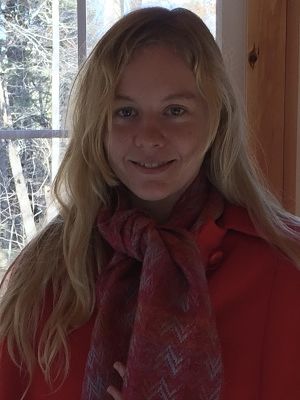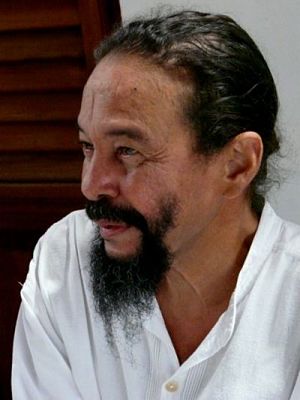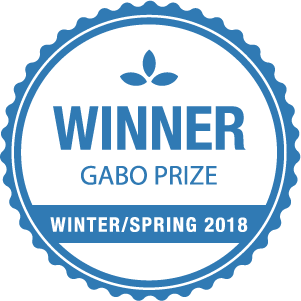Selected Poems from Black and Blue Partition: ‘Mistry 2
V
Fresheur and life
“Same current, waters always new”
The voice runs over the waters
speeches crossed from god to god
sorcerous heritage, seaswells burgeoning
with careful lightness
same as
same as grass crown, thatch, lalang;
water crystalline, upslope downslope harmony,
that the spirits’ good humor won’t cloud.
Begone-become, begone as foam
leaving home
doors and windows opened,
Beauty seated legs akimbo:
nest fledgling
dirtmouse wings
lalang grass tufts spit
shark mouth agape.
Let frogs renew and multiply
Chârme
Ô, the quivering like a sliver of moon
the red red erythrina
and below the chirruping cantations of the initiated
the little antelope climbingclimbing toward the palm divinity,
Let humidity be that venerable weave, omnipresent
witchgrass, springside presages,
Let fresh water trickle anoint drum and bullock,
Let the serpent’s carcass burrow through the sand
head and tail python enclosure-held
ring the bells to empty them;
“The great swamp waters flow downriver”
behind the mornes
secret
among the leaves,
Let home be of fresheur, walls smooth
did she rattle the lightning, that little silken thing?
did she cut the flesh deep, that millstone, did she gash open the ribetting of those gounouy?
did he wash his flesh from the river,
Did he prostrate at the threshold of the city Abydos,
Did he pass through the thorns,
Did he take concession?
Is he proud, impatient?
The charm:
at first simple millet cake,
at first mixed millet cake
liana leaves licorice crushed
then millet cake, leaves liana licorice
and honey follewz;
and yãmn-leaffes for collecting water.
Then charm e’jaculatoire in hushed tones (three times)
Three times ‘round the items,
in the crossing.
And obscene chanting,
Ouaïe—Ouaïe
Man kèy lélé-é-y
Man kèy lélé kalalou-a
O the law of enclosure!
And open let the way be, of overflowing, of fertility,
Vitamtènam
in the light of the ark of the waters of the world.
IV
The child who birthed the mother
compass of winds, its rhombuses
the hill, its three palm trees,
the beauty named “Beauty”
below, rivers and lagunes.
In the water the child birdstares, the child who birthed the mother,
the sixteen quarters of the sky
Yémaya’s divine body,
Grace of chills, of charms,
figures carried by chance
as the banks of Enjillé’s jetties, open to signs,
coquillage and kola nuts
fem-mules.
The beauty named “Beauty” birdstares, sways,
reflective mask, peaceful, grave
abandoned to the flood, the swell,
the famous hill where three palm trees grow
the famous, and below d’lo,
void approves, baptizes.
Shimmers sway, go
one bank the other
the Far-off is never far “all weighed and measured”
the gods exist in the water
the sky is in the water
in the water paradise,
under the leaves, basins of flood,
Refresh and appease the vestibules of pleasure,
from saliva the fecundant charm
and above, the sorceries,
the mouth where “la Belle” sways
from one bank to the other
the two banks, the waters, their depths
from one bank to the other, the slicing grasses
the copious wild leaves
the riverbank rebuffs the waters sloshing to the other side,
here the crouching-god, here the sacred beast,
the hunchback opens the true path through the leaves.
Forged up the watercourse:
in the mirrorment the paradise,
the subtle game of reflections,
reflections inebriated,
the sounds enchantment,
absolute lightness,
Appear-disappear
the mask,
the showing
unity of all
piety in all.
Forging up the rivercourse,
little shards of clay, the fat ram,
maternal breast,
peace in the body, peace in the courtyard.
![]()
Copyright: Partition noire et bleue: (Lémistè 2) (Obsidiane, 2016)
V
Fraîcheur et vie
« Même fleuve, eaux toujours nouvelles ».
La voix court sur les eaux
paroles transmises d’un dieu à un dieu
héritage magique, commencement des flots
avec légèreté soyeuse
même que
même que graminée fanée du lalang ;
Eau limpide, harmonie grave aigu,
que n’assombrisse la bonne humeur des esprits.
Disparaître-devenir, disparaître comme l’écume
laissant maison
ouvertes portes et fenêtres,
Beauté assise jambes écartées :
nid oiselet
ailes solsouris
touffes herbe lalang salive
gueule requin béante.
Que grenouille renouvelle et multiplie
Châme
Ô, cela qui palpite comme brin de lune
la rouge rouge érythrine
et dessous le gazouillis de l’initié
La petite antilope qui grimpe grimpe au divin palmier,
Qu’humide toujours soit la natte vénérable,
le chiendent, les prémices près de la source,
Que tambours et taurillons soient aspergés d’eau fraîche,
Que la caresse du serpent creuse le sable
tête et queue python dans enclos
agite grelots qu’ils se vident ;
« L’eau du grand marais coule dans la rivière »
derrière collines
secret
parmis les feuilles,
Qu’elle soit fraîche la demeure aux parois lisses,
a-t-elle ébranlé la foudre, la petite chôye soyeuse ?
A-t-elle couvert la gounouille de plaies, la pierre de meule ?
Lui a-t-on enlevé sa peau sur le fleuve,
S’est-il prosterné devant la porte de la cité d’Abydos,
A-t-il passé entre les épineux,
Est-il entré dans la concession ?
Est-il fier, impatient ?
Le charme :
d’abord simple gateau mil,
d’abord gateau mil mélangé
feuilles liãne réglisse crasé
puis gateau mil, feuilles liãne réglisse
et miel ensouite ;
et fèuille-yãnm pour aller puiser l’eau.
Puis charme jaculatoire à voix basse (trois fois)
Trois fois près les affaires,
tout au bord mait’ zaffai,
dans l’entre-jambe.
Et des chantés obscènes,
Ouaïe—Ouïe
Man kèy lélé-é-y
Man kèy lélé kalalou-a
Ô la loi de l’enclos !
Et qu’ouverte soit la voie de l’abreuvage, le chemin de fécondité,
Vitamtènam
dans la lumière de l’arche les eaux du monde.
IV
L’enfant qui enfanta la mère
Rhombes de la rose des vents,
belle colline aux trois palmiers,
La belle surnommée « la Belle »
au-dessous, fleuves et lagunes.
Dans l’eau miroise l’enfant qui enfanta le mère,
les seize quartiers du ciel
sur le corps divin de Yémaya,
Grâce du saisissement, charmes,
figures amenées par le hasard
comme aux rives d’Enillé jetées ouvertes aux signes,
coquilles et noix kola des femmes-mules.
La belle surnommée « la Belle » miroise, se balance,
masque réfléchi, grave, paisible
abandonnée au flot,
la fameuse colline où poussent trois palmiers
la fameuse, et au-dessous l’eau,
vide qui agrée, fonts baptismaux.
Le reflet se balance, va
une rive l’autre
le Lointain n’est jamais loin « tout bien pesé »
les dieux existent dans l’eau
le ciel est dans l’eau
dans l’eau le paradis,
sous les feuillages, bassins d’inondation,
Rafraichissent et apaisent les vestibules du plaisir,
De la salive le charme fécondant
et par-dessus, les sortilèges,
la bouche où « la Belle » se balance
d’une rive à l’autre
les deux rives, les tréfonds des eaux
d’une rive à l’autre, les herbes tranchantes
les feuilles sauvages bien frues
la berge qui rabroue vers l’autre berge les eaux clapoteuses,
ici le dieu-accroupi, l’animal sacré,
le bossu qui ouvre le bon chemin parmi les feuilles.
Remonté le fil de l’eau :
dans le miroisement le paradis,
le jeu subtil des reflets,
l’ivresse du reflet,
l’ensorcellement des sons,
l’absolue légèreté,
Paraître-disparaître
Le masque,
Le laisser-apparaître
L’unité de tout,
La piété en tout.
Remonté le fil de l’eau,
petits morceaux de glaise, le bélier gras,
le sein maternel,
la paix dans le corps, la paix dans la cour.
Translator’s Note:
For Monchoachi, language is a site of both play and resistance, a rhizomatic system of becomings, origins, and renewals. As fellow writer Patrick Chamoiseau describes, “[Monchoachi] has completely renewed our vision of the Creole language—the way we read it, practice it, defend it. He has reshaped the relationship of this language to French, and has explored the blossoming of an unheard speech, its explosion into life, which we become witness to in Lémistè.”
My translation strives to reflect/refract this performative [re-]visioning, which Monchoachi so adeptly applies to his seemingly meandering (but always intentional, and sometimes instructive) narrative. In these poems, he is reaching into an oceanic sub-terrain—emerging here into ancient Yoruban spiritual practice, there becoming a Martinican river becoming a man becoming sacred—and all of it oscillating at the tip of his tongue. By extension, these poems strive to oscillate on the tips of the readers’ [multiple] tongues, to disorient and subvert the limitations of language in order to open and influence it with magic, the mysterious. The power of these poems is found in their physical and spatial integrality; they reside in the body, in the land and in the water. As a result, although the reader is carried through the intangible into the cantatory, we remain grounded, with a taste of the air in our mouths. With these translations I hope to showcase/carry Monchoachi’s linguistic project in a way that propels both the craft of translation and the presence of Creole literature in the Anglophone world.
![]()
Special Guest Judge, William Rodarmor:
Patricia Hartland set herself a major challenge in translating Monchoachi, a poet prolific in both French and Martinican Creole. Monchoachi is the pseudonym of André Pierre-Louis, who was born in Martinique in 1946. Hartland calls his work “a site of both play and resistance… of becomings, origins, and renewals.” Patrick Chamoiseau says Monchoachi has completely renewed the relationship of the Creole language to French. This means that a vigilant translator must look in two different linguistic directions while plotting her course in a third.
Hartland brings impressive skills to the task. An MFA candidate for poetry at Notre Dame, she focuses on post-colonial, linguistically hybrid, francophone texts. And she lends a deft touch to her Monchoachi translations. Here is a sample from “The child who birthed the mother”:
Forged up the watercourse:
in the mirrorment the paradise,
the subtle game of reflections,
reflections inebriated,
the sounds enchantment,
absolute lightness,
Appear-disappear
the mask,
the showing
unity of all
piety in all.
—William Rodarmor is an editor and French literary translator in Berkeley, California. He has translated some forty-five books and screenplays in genres ranging from serious fiction to espionage and fantasy. In 1996 he won the Lewis Galantière Award from the American Translators Association for Tamata and the Alliance, by Bernard Moitessier. In 2016, he won the Northern California Book Award for fiction translation for The Slow Waltz of Turtles, by Katherine Pancol.
 Patricia Hartland is a candidate for the MFA in poetry at the University of Notre Dame, and a recent graduate of the Iowa Translation Workshop. She translates from French, Martinican Creole, and Hindi, with a special interest in Caribbean literature. Her translations of prose, poetry, and theatre have appeared or are forthcoming in Asymptote, Circumference, Drunken Boat, Two Lines, and elsewhere.
Patricia Hartland is a candidate for the MFA in poetry at the University of Notre Dame, and a recent graduate of the Iowa Translation Workshop. She translates from French, Martinican Creole, and Hindi, with a special interest in Caribbean literature. Her translations of prose, poetry, and theatre have appeared or are forthcoming in Asymptote, Circumference, Drunken Boat, Two Lines, and elsewhere.
 Born in 1946 on the island of Martinique, Monchoachi is the recipient of numerous awards, including the Prix Carbet de la Caraïbe and the Prix Max Jacob. In 2007 he founded the Lakouzémi Project, an annual gathering of writers, dancers, performers, and activists: together they vivify history and generate meaningful, actioned community.
Born in 1946 on the island of Martinique, Monchoachi is the recipient of numerous awards, including the Prix Carbet de la Caraïbe and the Prix Max Jacob. In 2007 he founded the Lakouzémi Project, an annual gathering of writers, dancers, performers, and activists: together they vivify history and generate meaningful, actioned community.





